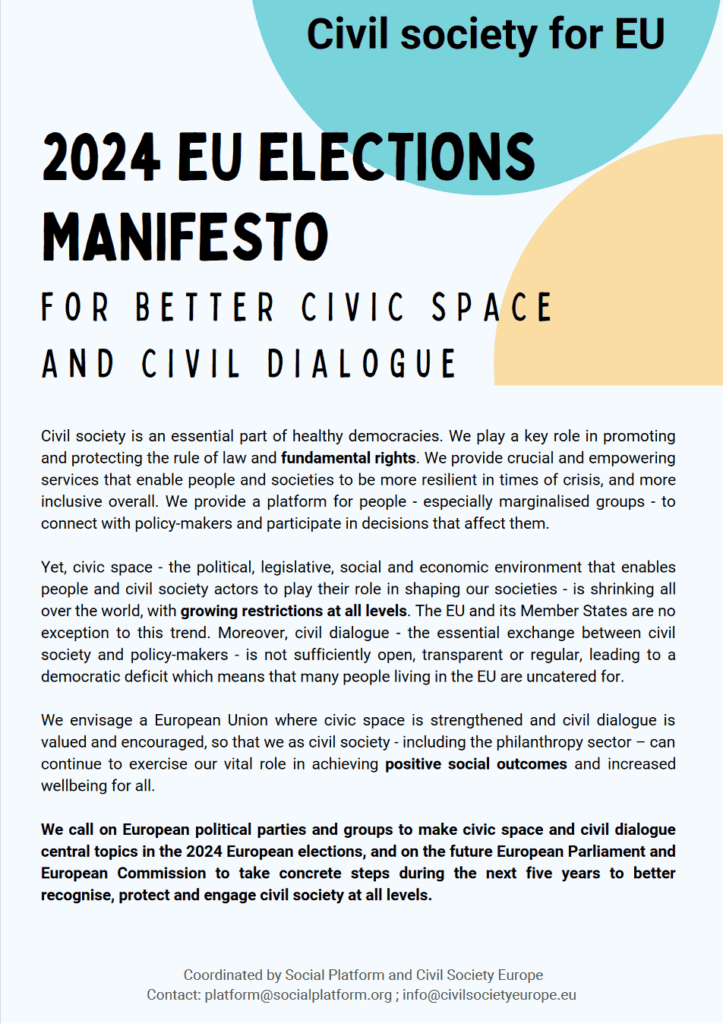Together with other 68 organisations and networks, ACT ALLIANCE EU has joined the campaign “Civil Society for EU” to strengthen civil dialogue and civic space across the EU through better recognition, involvement, and resourcing of civil society. In the campaign manifesto, we call on the European Parliament and Commission to take concrete steps to create an empowering environment for civil society after the next EU elections, starting with the development of a European Civil Society Strategy and a Civil Dialogue Agreement.
Summary
Civil society is an essential part of healthy democracies. We play a key role in promoting and protecting the rule of law and fundamental rights. We provide crucial and empowering services that enable people and societies to be more resilient in times of crisis, and more inclusive overall. We provide a platform for people – especially marginalised groups – to connect with policy-makers and participate in decisions that affect them.
Yet, civic space – the political, legislative, social, and economic environment that enables people and civil society actors to play their role in shaping our societies – is shrinking all over the world, with growing restrictions at all levels. The EU and its Member States are no exception to this trend. Moreover, civil dialogue – the essential exchange between civil society and policy-makers – is not sufficiently open, transparent, or regular, leading to a democratic deficit which means that many people living in the EU are uncatered for.
We envisage a European Union where civic space is strengthened and civil dialogue is valued and encouraged, so that we as civil society – including the philanthropy sector – can continue to exercise our vital role in achieving positive social outcomes and increased wellbeing for all.
We call on European political parties and groups to make civic space and civil dialogue central topics in the 2024 European elections, and on the future European Parliament and European Commission to take concrete steps during the next five years to better recognise, protect and engage civil society at all levels.
A European Civil Society Strategy
The European Civil Society Strategy calls for comprehensive EU action to counter the trend of shrinking civic space and bolster support for civic actors. It emphasises the need for a strategic approach to strengthen civil society organisations (CSOs) and human rights defenders, safeguarding them against attacks and negative campaigns. Key aspects include:
- A Safe and Enabling Environment for Civil Society: To ensure the flourishing of civil society, it is imperative to establish an open, safe, accessible, and enabling regulatory and political environment. This includes the removal of all restrictions to civic space, the guarantee of freedom of association, assembly, and expression, and the formal recognition of the role of civil society by decision-makers at both EU and national levels. Moreover, fostering transnational cooperation among CSOs is essential in addressing societal challenges with European or global dimensions.
- An EU Mechanism to Protect Civil Society, Activists, and Defenders: Civil society actors, including staff, volunteers, activists, and defenders, must be safeguarded from discrimination, harassment, violence, and ill-treatment. We call for the establishment of an EU mechanism to enable CSOs to report attacks and limitations on civic space, with an early warning system to prevent threats from escalating. Special attention should be given to minorities and marginalised groups who are particularly vulnerable.
- Adequate Funding: The involvement of civil society in the design of funding policies and programmes is crucial for effective resource allocation. We advocate for simplified administrative procedures and increased accessibility to funding, especially for grassroots and volunteer-run organisations. Additionally, regulatory and fiscal obstacles to funding and donations, both domestically and across borders, must be addressed to facilitate cross-border philanthropy and ensure sustained support for civil society initiatives.
A Civil Dialogue Agreement
Civil dialogue is integral to the democratic process, serving as a vital conduit for citizen engagement in policy-making. We propose several key measures to strengthen and institutionalise civil dialogue within the European Union:
- Inclusive Participation of Civil Society Organisations (CSOs): CSOs, representing diverse interests and communities, should be granted substantive involvement in all stages of policy-making at both EU and national levels. This entails moving beyond tokenistic gestures towards genuine collaboration, where CSOs serve as strategic partners in policy development, programme design, debates, and agenda-setting exercises.
- Promoting Transparency and Accessibility: We advocate for heightened transparency in EU and national policy processes. This involves ensuring equitable access to decision-makers and relevant documentation, including legislative preparatory works. Information should be disseminated in a clear, accessible, and timely manner to facilitate meaningful engagement by civil society actors.
- Empowering Civil Society Representatives: The roles of the Vice Presidents of the European Parliament and the European Commission responsible for civil society dialogue should be reinforced. Their mandates should be expanded to facilitate structured civil dialogue and to assess the coherence of EU policies impacting civil society. Additionally, proactive measures should be taken to support civil actors facing external pressures.
- Establishing Permanent Civil Dialogue Structures: Permanent civil dialogue mechanisms should be established at appropriate levels within each Member State and EU institution, including the European Council. These structures will ensure consistency and coordination across institutions and facilitate sustained engagement between civil society and decision-makers. Adequate funding and resources should be allocated to support CSOs’ meaningful participation in these dialogues, enhancing their operational capacity.
Endorse the manifesto here
